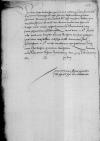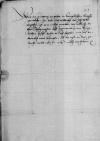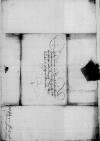List #4426
Ioannes DANTISCUS do Gdańsk Town CouncilHeilsberg (Lidzbark Warmiński), 1543-11-13
| odebrano Gdańsk (Danzig) Rękopiśmienne podstawy źródłowe:
| ||||
Tekst + aparat krytyczny + komentarz Zwykły tekst Tekst + komentarz Tekst + aparat krytyczny
Den ersamen und namhaftigen herren
Unsern freuntlichen grues und alles gutten zuvoran. Ersame, namhafftige hernn, besonndere, guete freund. /
Unns ist kurtzlich
Datum aus unserm schlos
Was die quittantz angehet in koniglichem brieffe gemeldet, / in dem sich villeicht der schreyber vorsehen, / ist uns nichts worden, / des villeicht der her



 APG 300, 53, 268, p. 204
APG 300, 53, 268, p. 204